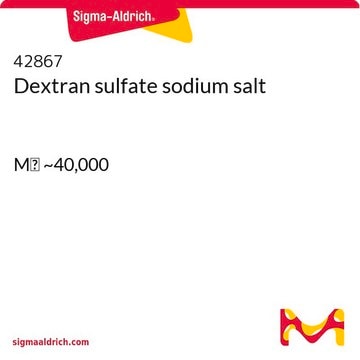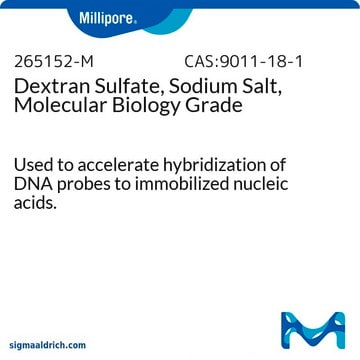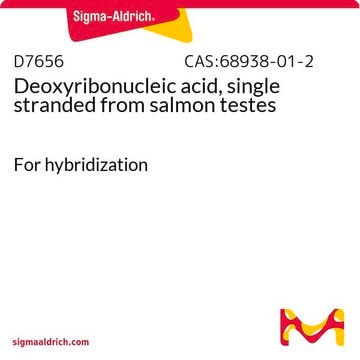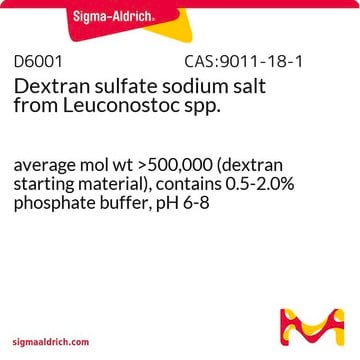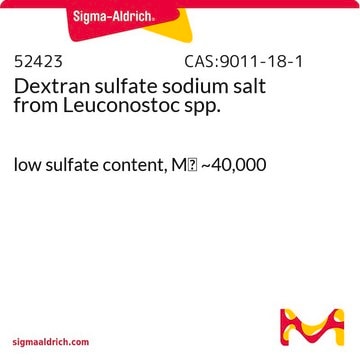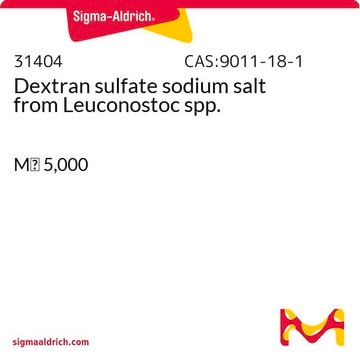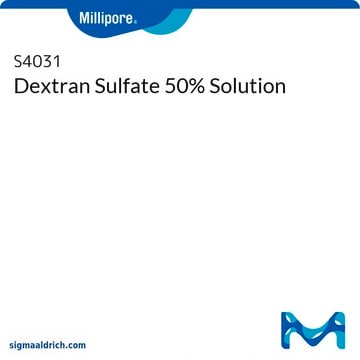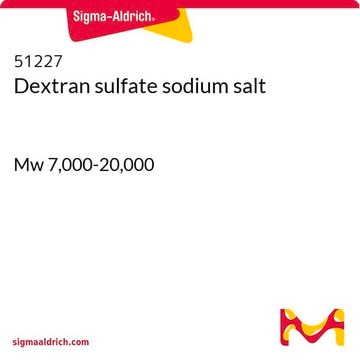D8906
Dextran sulfate sodium salt from Leuconostoc spp.
for molecular biology, average Mw >500,000 (dextran starting material), contains 0.5-2% phosphate buffer
Synonym(s):
6-O-(6-O-beta-D-Glucopyranosyl-beta-D-glucopyranosyl)-D-glucose, Manninotriose
About This Item
Recommended Products
biological source
synthetic
Quality Level
grade
for molecular biology
form
powder
mol wt
average Mw >500,000 (dextran starting material)
contains
0.5-2% phosphate buffer
composition
Sulfur Content, 16.0-19.0%
technique(s)
FISH: suitable
FTIR: suitable
color
off-white
useful pH range
6.0-8 (10 g/L)
solubility
H2O: 100 mg/mL
suitability
suitable for marker for electrophoresis
suitable for nucleic acid hybridization
application(s)
genomic analysis
sample preparation
Looking for similar products? Visit Product Comparison Guide
General description
Application
- as a molecular weight marker to assess the purity and homogeneity of the purified polysaccharides by gel electrophoresis
- as a component of the hybridization buffer in fluorescence in situ hybridization (FISH) protocol for DNA detection and analysis
Biochem/physiol Actions
Features and Benefits
- Suitable for Nucleic acid hybridization & Molecular Biology
- Dextran Sulfate with an average molecular weight of >500,000
- Sulfur Content of 16.0-19.0 %
- Versatile and adaptable for wide variety of laboratory and research applications
Suitability
Other Notes
comparable product
Storage Class Code
11 - Combustible Solids
WGK
WGK 2
Flash Point(F)
Not applicable
Flash Point(C)
Not applicable
Personal Protective Equipment
Choose from one of the most recent versions:
Certificates of Analysis (COA)
Don't see the Right Version?
If you require a particular version, you can look up a specific certificate by the Lot or Batch number.
Already Own This Product?
Find documentation for the products that you have recently purchased in the Document Library.
Customers Also Viewed
Articles
Available Fluorescent in situ hybridization (FISH) procedures, reagents and equipment.
Available Fluorescent in situ hybridization (FISH) procedures, reagents and equipment.
Available Fluorescent in situ hybridization (FISH) procedures, reagents and equipment.
Available Fluorescent in situ hybridization (FISH) procedures, reagents and equipment.
Protocols
Dextran sulfates as sodium salts are water-soluble and stable, containing approximately 17% sulfur for various applications.
Dextran sulfates as sodium salts are water-soluble and stable, containing approximately 17% sulfur for various applications.
Dextran sulfates as sodium salts are water-soluble and stable, containing approximately 17% sulfur for various applications.
Dextran sulfates as sodium salts are water-soluble and stable, containing approximately 17% sulfur for various applications.
Related Content
Dextrans are polysaccharides with molecular weights ≥1,000 Dalton, featuring a linear backbone of α-linked d-glucopyranosyl repeating units.
Dextrans are polysaccharides with molecular weights ≥1,000 Dalton, featuring a linear backbone of α-linked d-glucopyranosyl repeating units.
Our team of scientists has experience in all areas of research including Life Science, Material Science, Chemical Synthesis, Chromatography, Analytical and many others.
Contact Technical Service